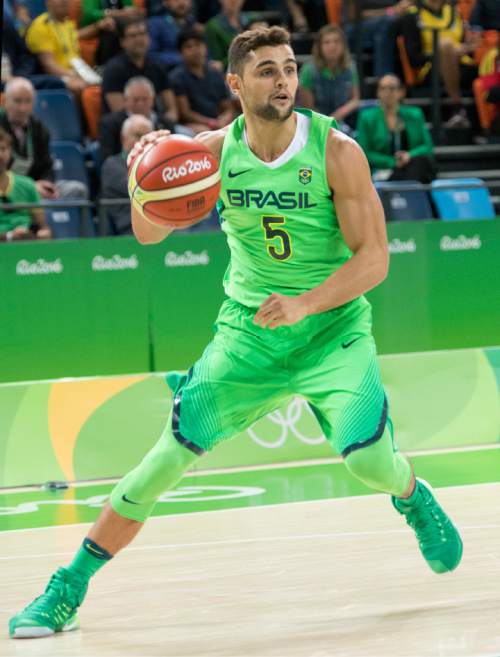This is an archived article that was published on sltrib.com in 2016, and information in the article may be outdated. It is provided only for personal research purposes and may not be reprinted.
Rio de Janeiro • Just when every other problem surrounding Brazil's Olympics seemingly was resolving itself, the outdoor diving pool turned green.
In the nearby swimming venue, the water remained almost purely golden for American swimmers.
Katie Ledecky, Michael Phelps, Simone Manuel and other swimmers became the biggest story of the first full week of the 2016 Games. Mix in captivating performances from gymnast Simone Biles, Fiji's rugby team and an unheralded swimmer from Singapore who upset Phelps, and you have the makings of another Olympics that is rising above the issues that dominated the buildup to Rio.
Well, sort of. Even as fears about the Zika virus, ocean contamination and Rio's overall capability subsided, more trouble emerged. Organizers closed the diving pool Friday, because a mysterious imbalance turned the water green and led a Rio 2016 spokesperson to rationalize, "Chemistry's not an exact science."
Chemists may disagree. In any case, amid all of the previous worries about Rio, who could have seen this coming? Green water in the pool? What's next, ties in a swimming race?
Even if the water's composition was inexplicable, other developments became clearly established during the week as athletes pursued the U.S. Olympic Committee's 1,000th gold medal in Summer Games history.
The list includes Phelps' phenomenal legacy, the Pac-12's status in Olympic sports and the reminder that memorable performances can come from anywhere — even Fiji, with the new sport of rugby sevens resulting in the country's first medal.
There's much more to be learned from this first week of the Games, leading into a second week that will feature basketball with Utahns among the genuine medal hopefuls and a lot of Usain Bolt on the track. Among the things we know so far is that bold talk from a swimmer who backs it up is admirable; calling an opponent "a bunch of cowards" after a loss is not.
Lilly King said she was "not a fan" of Russia's Yulia Efimova, once sanctioned for doping, and then beat her in the 100-meter breaststroke. USA goalkeeper Hope Solo criticized Sweden's tactics after her team surprisingly was eliminated from the tournament. Soccer purists may support her, but the average Olympic fan expects more grace from athletes.
Phelps showed more of a playful, human side in these Games as he exited the stage, having dominated his sport — except for somehow finishing in a three-way tie for second in the 100 butterfly. So did Manuel, who became the first African-American woman to win a swimming gold medal (via another tie), but emphasized she wanted to be known as more than a "black swimmer." She's a Stanford student, one of the many current or former Pac-12 athletes thriving in the Games.
The conference logo would incorporate Olympic rings, if licensing allowed it. As of Saturday afternoon, Pac-12 athletes or alumni had won 28 medals (including 15 gold) in Rio, which would rank third among countries.
That status won't last, because swimming is over. Yet Ledecky's enrolling at Stanford after winning four gold medals is the latest sign of what competing in this league is like. "This isn't something you just kind of casually do," said Joe Dykstra, the University of Utah's director of swimming. "If you win a Pac-12 title, you're one of the world's best swimmers."
Coaching in the Pac-12, Dykstra expects to produce Olympic swimmers by 2020. For now, a bunch of basketball players will have to do. Any of the six former Ute men and women — representing Australia, France and Canada — could earn a medal. Four current Utah Jazz players also have a shot, even if Raul Neto missed his opportunity Saturday to became a Brazilian hero as his would-be winning 3-pointer bounced off the rim in the first overtime of an eventual double-OT loss to rival Argentina.
In person, nothing resonates in the Olympics like home-venue team sports, and that could have been Brazil's biggest moment in these Games. Generally, the Brazilians are making this operation work, beyond expectations.
All they have to do now is get the divers' water to turn blue, as the Games move into a final week that's usually something of a letdown for American viewers after the excitement created by the departed swimmers. Other stars will emerge; they always do. Unforeseen problems, like green water? Those are inevitable too.
Twitter: @tribkurt —
Utah's gold medalists
Four athletes born in Utah have contributed a total of five gold medals to the USA's drive toward 1,000 in the Summer Games:
Athlete Sport Year
Alma Richards Track and field 1912
Lee Stratford Barnes Track and field 1924
Dorothy Poynton Hill Diving 1932
Dorothy Poynton Hill Diving 1936
Cael Sanderson Wrestling 2004



